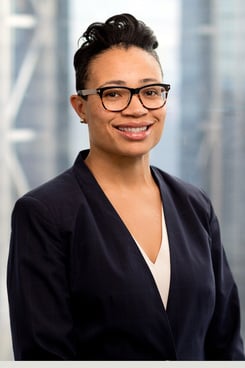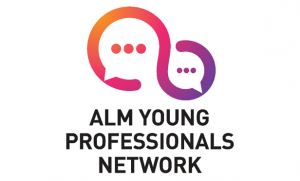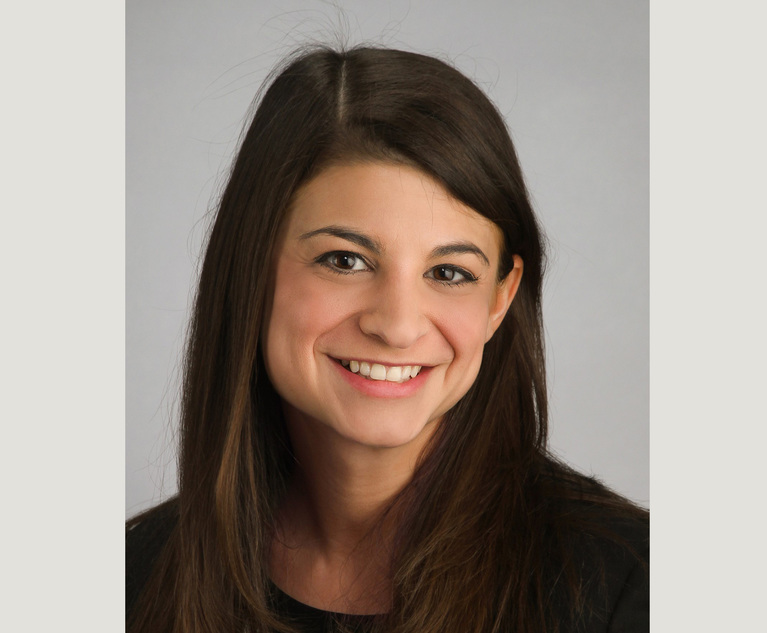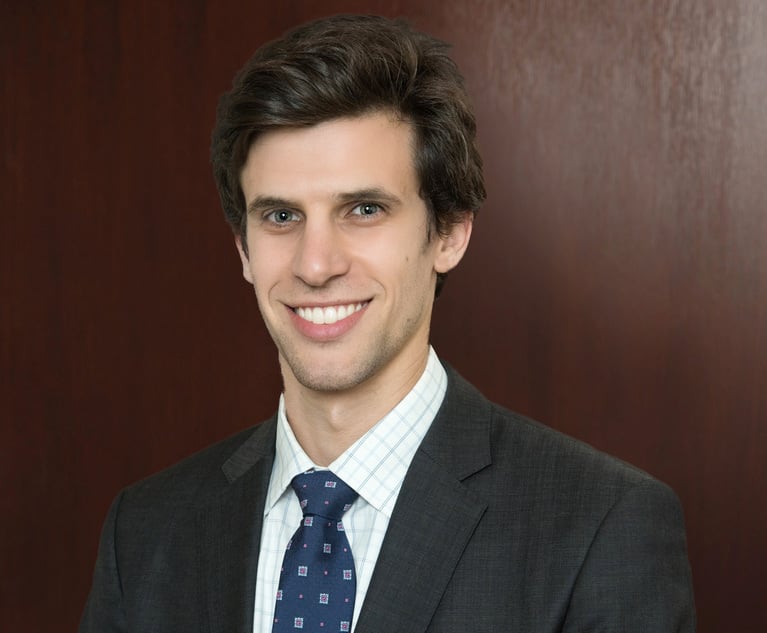Tiffany J. Smith, 38, WilmerHale
Office: New York.
Job title: Partner.
Practice area: Securities and Financial Services.
Law school and year of graduation: The George Washington University Law School; 2008.
How long have you been at the firm? I was a summer associate in 2007 and started as an associate in 2008.
How long were you an associate at the firm? I was an associate and senior associate from 2008 through 2014 and counsel from 2015 through 2018.
What year did you make partner at your current firm? I was elected to the partnership in October 2017 and became a partner, effective Jan. 1, 2018.
 Tiffany Smith. (Courtesy photo)
Tiffany Smith. (Courtesy photo)
What’s the biggest surprise you experienced in becoming partner? The biggest surprise I experienced after becoming partner was that I quickly learned how much support I had around me. I knew that I had strong relationships with partners at the firm and with numerous colleagues in the industry, but I was overwhelmed by the number of folks both internally and externally who reached out to me after my elevation and offered support in various ways. For example, an established partner from another law firm took me to dinner to provide advice about business development, raising my profile, and introduced me to a network of diverse partners in New York City. It has been tremendously helpful to have the support and insight of more senior partners as I build my practice.
What do you think was the deciding point for the firm in making you partner? I believe I made partner as a result of a number of factors. First, I consistently produced high-quality work product and effectively anticipated the needs of my external and internal clients. Second, I developed a broad array of expertise in broker-dealer regulation and quickly learned about new areas of innovation (e.g., digital assets, cryptocurrency). Third, I built my profile both inside the firm and externally by serving on a number of firm committees (e.g., Hiring, Diversity and Inclusion, Pro Bono and Community Service) and attending and participating in various networking events and conferences.
Describe how you feel now about your career now that you’ve made partner. I feel fortunate to have all the opportunities and support that helped me make partner but also feel like I am just beginning to achieve the goals I’ve set for myself in the hopes of leaving my mark on the legal industry.
”It is easy to fall into self-doubt early in your career when the challenges you face may seem insurmountable. But the key is to remember that these initial tests will lead to tremendous growth and result in the career success you seek.”
What’s the key to successful business development in your opinion, and how do you grow professionally while everyone is working remotely? The key to successful business development is consistency and intentionality. I foster and nurture my existing relationships and find ways to connect with new contacts outside my current network. Although most of the industry is working remotely, the only change is the way in which I connect with my contacts. Instead of fostering and nurturing my relationships during in-person events, this connection takes place virtually. Many organizations have started holding their in-person conferences and events virtually, and I try to attend these events as often as possible and connect with the other attendees by using the built-in networking functions on each platform, initiating and participating in discussions during the sessions and following up with other attendees via e-mail or LinkedIn after the conference has ended.
What’s been the biggest change, day to day, in your routine since becoming partner? The biggest change in my day-to-day routine since I became partner is working more closely with partners across the firm. Prior to making partner, I primarily worked with the partners in my department, but this changed once I made partner. One of the many great things about WilmerHale is how seamlessly partners work together across the firm to provide the best possible advice to a client. To this end, I often get calls from partners in other groups to consult on broker-dealer or digital asset issues, and it’s one of my favorite parts of the job. Often these questions come up in the context of ideas for innovation or new technologies, and it is both fascinating and challenging to apply existing law to new technologies.
Who had the greatest influence in your career that helped propel you to partner? The chair of my practice group, Yoon-Young Lee, has had the greatest influence on my career and was instrumental in propelling me to partner. When I was a junior associate, she not only went out of her way to tell me that I was doing a great job, but she praised my work publicly when speaking with other folks at the firm. As I became more senior, she provided great advice about how to be successful at the firm and also helped me take advantage of key opportunities to progress as an attorney.
What advice could you give an associate who wants to make partner? Would your advice be any different now than before COVID-19? I would advise an associate who wants to make partner not to focus solely on that goal but instead on developing as a lawyer. There are many factors that go into making partner, including factors outside of a candidate’s control (e.g., business case), but we’re all in control of making the most out of opportunities provided to us, seeking new and challenging casework and finding ways to enhance our internal and external profiles. This advice is no different than what I would have provided pre-COVID, but the ways to succeed in some of these areas has changed since we have begun working remotely so I would encourage associates to be flexible.
How do you network at a time like this? I network largely by attending virtual events. Most organizations have pivoted to online formats that provide tools to facilitate networking. When there’s no built-in networking tool, I make a point of following up with other event attendees by using the chat feature or sending email or LinkedIn messages following the event’s conclusion to strengthen existing relationships and make new connections.
Knowing what you know now about your career path, what advice would you give to your younger self? If I could give advice to my younger self, I would look to provide encouragement and motivation. Most attorneys know the path they need to follow and the benchmarks they need to hit in order to make partner. The hard part is staying the course over a period of several years while faced with the uncertainty of whether you will achieve your ultimate goal on top of other potential challenges (e.g., a pandemic). So, I would provide assurance to my younger self that each obstacle along my path, each challenge faced, is a necessary opportunity. For junior associates, it is easy to fall into self-doubt early in your career when the challenges you face may seem insurmountable. But the key is to remember that these initial tests will lead to tremendous growth and result in the career success you seek.
Find more career development insights from our ‘How I Made It’ Q&A series on law.com.
 ALM’s Professionals Network on LinkedIn. Advancing Future Leaders. We are excited about this pivotal group. Click here to join.
ALM’s Professionals Network on LinkedIn. Advancing Future Leaders. We are excited about this pivotal group. Click here to join.
NOT FOR REPRINT
© 2024 ALM Global, LLC, All Rights Reserved. Request academic re-use from www.copyright.com. All other uses, submit a request to [email protected]. For more information visit Asset & Logo Licensing.













